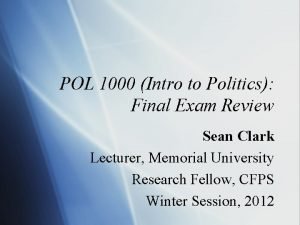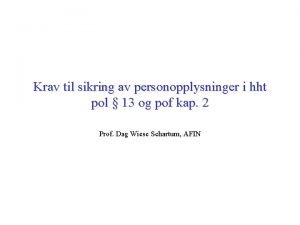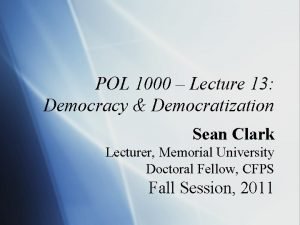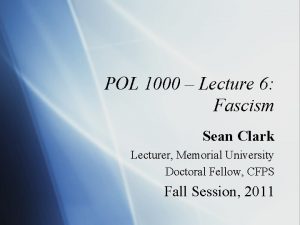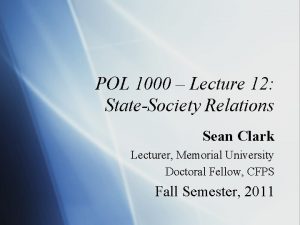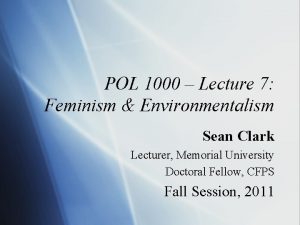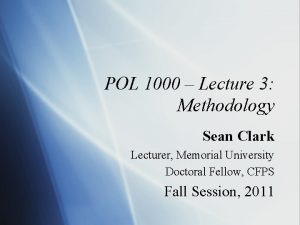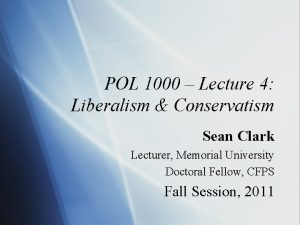POL 1000 Lecture 15 Nations Nationalism Sean Clark









- Slides: 9

POL 1000 – Lecture 15: Nations & Nationalism Sean Clark Lecturer, Memorial University Doctoral Fellow, CFPS Fall Session, 2011

Lecture Arc § 1. Nations & Nationalism. § 2. Theories of Nationalism. § Primordialism. § Modernism. § 3. Nationalism & Globalization. § 4. Nationalism in Contemporary Politics.

Nationalism § ‘Nation’: communities united by sense of solidarity, & expressing political behaviour. § Usually predicated on common language, religion, ancestry (real or imagined), history, & culture. § Is an ideational phenomenon. Renan: are ‘imagined communities. ’ § Kedouri: natism is doctrine that “holds that humanity is naturally divided into nations, that nations are known by certain characteristics which can be acsertained, and that the only legitimate type of government is national self-government. ” (p 9) § Is truly ideological way of viewing the world: see world is divided into nations, & seeks to remake pol in that image, regardless of claims of hist, econ, or geog. I. e. Herder & Humboldt. Focus on linguistic diffs (i. e. Tower of Babel). § Political aspect is key: is ethnic solidarity amongst Germans in Sask. , but do not clamour for political autonomy. § Is not the same as a state (states often comprise of many nations. § ‘Nation-state’ like Korea, where border of the two overlap, is rare. § Prob: is difficult to agree where one ends & other begins. § Is a rather subjective definition—hence its danger. § ‘Nationalism’ is act of translating communal solidarity into political outcomes. § Gellner ‘ 97: idea that ‘political & cultural units should be congruent’ (each nation should get its own state). § Prob: everyone wants to be own state; few govts want to give territory up (i. e. 19 th. C E Eur rebellions, Yugoslavia 1990 -1995). § Irredentism (efforts to reclaim lost ‘national’ territory) a common problem, i. e. Alsace-Lorraine pre-WWI.

Theories of Nationalism § 1. Primordialists: tendency for ‘us/them’ dichotomy is deeply ingrained in human nature. § Search for political autonomy is simply modern expression of this. § Nations of Egypt, Ethiopia, Greece, & Israel go back 1000 s of years. § 2. Modernists: nationalism is simply a social construction (a set of ideas). § Is built on fabrication of myths & selective use of history (interpretation)—thus is fluid & malleable. § Cleavages can therefore be overcome. § Is a product of modernity, an outgrowth of Europe’s philosophical tradition. § Europeans cared about nationalism, they built our instxns, & thus now we do too.

Nationalism & Globalization § Does globalization stimulate or marginalize nationalism? § Cosmopolitanists: shrinking borders = ‘we-feeling’ less important than before. § Who needs parochialism when now cooperate across boundaries? Interdependence means identity matters less. § Nationalists: globalizxn can help our cause, bringing intl attention to our plight, & make our small economy viable. § Singapore too weak to survive predators in age of imperialism. But now, does quite well as entrepôt. § S Sudan: now you can see Khartoum is too harsh with us. § Meanwhile, though rejectionists of globalization abhor it, they can’t deny that the backlash it creates (i. e. Barber) bolsters their cause. (bin Laden uses it to further his cause). § Evidence is rather mixed. § International soccer matches are still rabid. Yet little mass conscription.

Nationalism in Politics § Nationalism has decisive political weight in a series of countries—many rich, stable, & otherwise content. § Canada: from ‘ 60 s ‘Quiet Revolution’ came movt in Quebec to re-assert regional control. § Led to referenda on separation in ’ 80 & ’ 95 (Yes: 40% & 49. 5%; No: 60% & 50. 5%). § PQ (provincial) & BQ (federal) continue efforts towards sovereign independence. § Spain: after 40 yrs of repression under Franco, Basque & Catalan separatist movts particularly strong. § Basques willing to resort to violence. ETA bombings have killed 1000 s. § Belgium: Flemish (Dutch speaking N, rich) vs Walloons (French-speaking S, poor) in constant struggle. § UK: N. Ireland, Scotland, & Wales all = headaches for (English-dominated) London. § Meanwhile, nationalism fuels violence in the Balkans, Kashmir, Rwanda, Congo, Sudan, Nigeria, etc.


Nationalism in Politics § In The Globe and Mail, Robert Joustra warns against the perils of “secular atheocracy, ” arguing that “when people’s most deeply held beliefs are banished from [the] public square, they no longer have a meeting place” and “the more likely it becomes that those ideas — uncontested — default into fundamentalism and sectarianism. ” It’s an intriguing proposition … all the more so because we can’t think of, and Joustra does not provide, a single example. When we ponder the most secular states and the least secular states, we see a great deal more fundamentalism and sectarianism in the latter. warns

§ In truth, no one is calling for a religious state or attacking faith. Rather, we are witnessing a showdown, across the West, between two competing definitions of “freedom of religion. ” In one definition, the public sphere is a wide-open space: Citizens are free to try to impose religion, to invoke their gods in legislation, to wear whatever symbols they like. It’s a marketplace of beliefs, and may the strongest prevail. In the other definition, that sphere is a neutral space: Religion is private and public places are unencumbered by competitions for divine supremacy. This definition recognizes that freedom of religion depends on a strongly defended freedom from religion. And freedom from religion is just as important for non-believers, who don’t want public life to be corrupted with spiritualism, as it is for devout believers, who don’t want their sacred beliefs to be sullied by the vicissitudes of politics.
